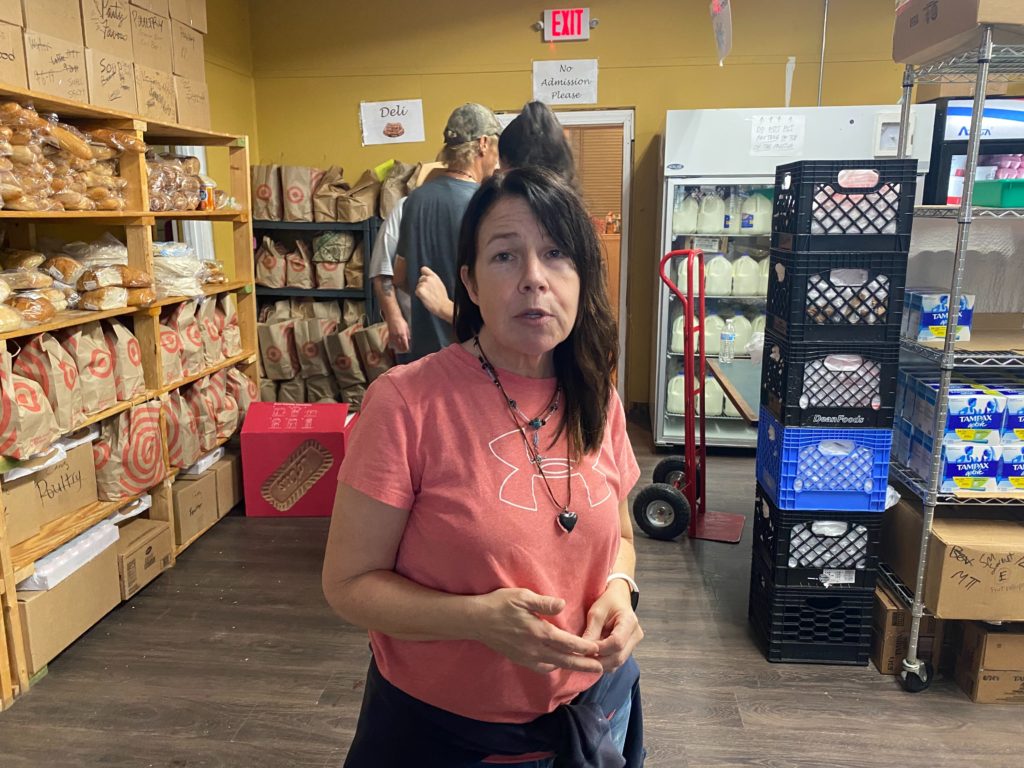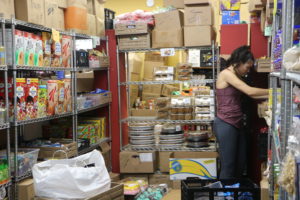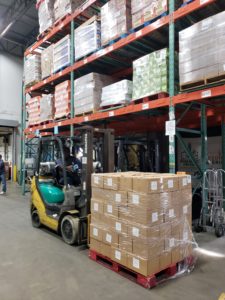
Stacey Downey says she’s stretched thin at time when residents need her food pantry the most.
She runs The Little Pantry That Could in North Nashville, one of the many food banks facing uncertainty because of the coronavirus and resulting economic downturn.
As Downey directs volunteers unloading a truck, she says she’s worried she won’t have enough resources to address food insecurity. The first week after things got bad, the pantry served fewer families because volunteers stayed home.
“It takes about 20 volunteers to do this,” Downey says. “We had four who showed up this morning. Since then, some of my friends have showed up, thank goodness. Otherwise we would still be unloading trucks.”
The small team unloaded more than 20,000 pounds of food, rolling carts into a one-story building before setting up a small grocery store.
 Damon Mitchell WPLN News
Damon Mitchell WPLN NewsA volunteer shelves food items.
“We have some really beautiful kale and lots of good lettuces,” Downey says. “We’ve got a ton of apples, pears, oranges. All kind of good stuff on produce today.”
The pantry was overwhelmed with volunteers after the Super Tuesday tornado. But then COVID-19 made its way to Nashville. That’s when new clients came pouring in, just as social distancing pushed volunteers out.
“So many people are calling and saying, ‘I just lost both my jobs. I’ve never been to a food pantry. I never thought I would have to call you. We don’t have anything. Can you help us?'”
The economy in Middle Tennessee has been hit hard. Recently, the region had more than 19,000 new unemployment claims in one week.
According to Hospitality Tennessee, the restaurant, bar and tourism industry has seen an 80% downturn alone. Just last week, bus tour company Gray Line Tennessee laid off 198 workers.
The coronavirus has also taken jobs from many entertainment workers, as most events and concerts have been cancelled.
“Whatever checks are already with me, they’re already spent,” says Anna Lindsay Sellers, an actress and performance artist. “[My] phone is due, electricity’s overdue, water’s overdue. [I] have to have gas in the car. It’s just going to pile up I’m sure.”
Sellers, a single mom of two, says work slowed after the tornadoes. But things have completely shut down since the spread of the virus, she says. She’s been a longtime volunteer at The Little Pantry, and says she’ll soon become a client of the food bank.
“I probably will dip into my tiny savings. There’s no plan for people like me. We’re just going to have to help each other out,” Sellers says.
Many of the pantry’s clients who work as janitors and restaurant workers were cash-strapped from a decrease in work following the storm, Downey says. Now they’re facing a wave of permanent layoffs. But at the same time, the pantry is faced with a larger client base without the resources of a big food bank.
Still, Ally Parsons, a spokesperson for Second Harvest Food Bank of Middle Tennessee, says large pantries may also take a hit.
“This is a situation none of us have ever faced,” Parsons says. “So what we’re doing now is evaluating what we currently have on hand, assessing all of the scenarios.”
Parsons says Second Harvest has a large support network to adapt to the virus but is unsure of how things will look in the future, especially when it comes to feeding kids.
 Second Harvest Food Bank of Middle Tennessee
Second Harvest Food Bank of Middle Tennessee Workers transport packaged meals for Metro Nashville Public Schools students.
“If schools do stay out through the summer, what does that look like? So we’re working with multiple partners, health officials, and governments to figure out what our resources are. But we definitely know we’re going to need more,” Parsons says.
Roughly one-in-eight Middle Tennesseans are already food insecure. State leaders have set up several relief funds for residents affected by the virus, but some fear it won’t be enough to address the crisis.
Downey says she tries not to think about the negative impact of COVID-19. Instead, she’s focused on a way to continue providing help to her clients.
“I’ll find a way to hustle it up,” Downey says. “It will come in.”

